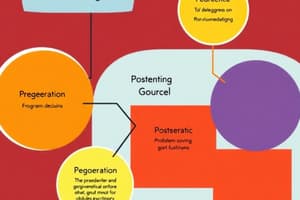Podcast
Questions and Answers
What is problem solving described as?
What is problem solving described as?
a mindset
What is the essential first step in problem solving?
What is the essential first step in problem solving?
- Develop a hypothesis
- Identify the root cause
- Understand the situation (correct)
- Take action
What helps identify all the root causes of problems?
What helps identify all the root causes of problems?
a logic tree
Building a logic tree is only useful for simple problems.
Building a logic tree is only useful for simple problems.
Which approach enhances the likelihood of solving a problem effectively?
Which approach enhances the likelihood of solving a problem effectively?
What should you do before collecting information to test a hypothesis?
What should you do before collecting information to test a hypothesis?
What is the purpose of developing a variety of solutions in problem-solving?
What is the purpose of developing a variety of solutions in problem-solving?
What is the key criteria for prioritizing actions?
What is the key criteria for prioritizing actions?
To achieve your dreams, you should break them down into smaller ______.
To achieve your dreams, you should break them down into smaller ______.
Writing down vague goals increases the likelihood of achieving them.
Writing down vague goals increases the likelihood of achieving them.
Flashcards are hidden until you start studying
Study Notes
Problem Solving Mindset
- Problem solving is a skill and a mindset.
- By balancing thinking and acting, problem solvers can overcome challenges.
- Problem solvers should address the root cause of problems.
Feedback and Growth
- Taking action and receiving feedback helps individuals grow as problem solvers.
- Problem solving involves understanding the situation, identifying the root cause, creating a plan, and executing it.
Logic Tree
- A logic tree lists all possible root causes of a problem without leaving anything behind.
- A logic tree can be used to group people or objects into a yes/no question.
Hypothesis
- A hypothesis is an educated guess about the likely root cause of a problem.
- Testing hypotheses helps find the best solutions to a problem.
Analysis and Information
- Collecting and analyzing information should be done with a clear question in mind.
- Data collected without a clear purpose is a waste of time and effort.
Identifying the Root Cause
- It's important to analyze and identify the root cause of a problem.
- The outcome of the analysis may differ from the original hypothesis.
Developing Solutions
- Create a variety of solutions to address a problem.
- The solutions should align with the goals of the problem solver.
Prioritizing Actions
- Prioritize actions based on key criteria, such as ease of implementation and impact.
- Use a priority matrix to determine the impact and ease of implementation of each action.
Implementation Plan
- Focus on tasks that have the most impact and are easiest to implement.
- Collaboration is essential for accomplishing tasks that require skills beyond one person's capabilities.
Fishy Goals and Solid Achievements
- Break down big dreams into smaller, achievable goals.
- This approach involves setting clear goals, developing a plan, and working on it consistently.
Setting Clear Goals
- Specific and descriptive goals are more likely to lead to success.
- Vague goals may not provide a clear direction for action.
- When creating a plan, define specific conditions that will be followed.
Studying That Suits You
Use AI to generate personalized quizzes and flashcards to suit your learning preferences.




